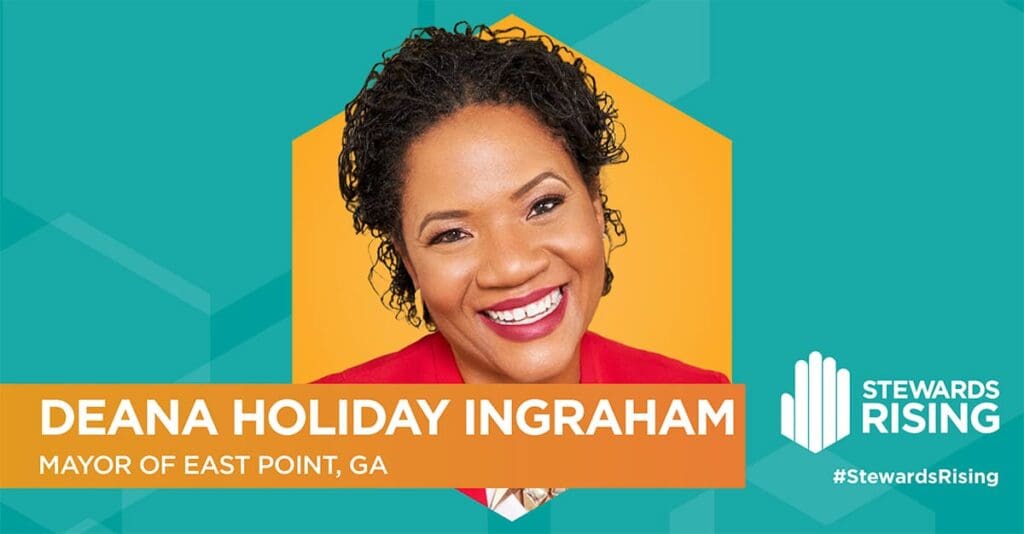A Mayor in Georgia Stewards Disruption to Write a New Story for Her City

Mayor Deana Holiday Ingraham, East Point, GA
July 15, 1912, is etched in Mayor Deana Holiday Ingraham's brain. It was the day, over a century ago, that opened the door to environmental injustice in her beloved City of East Point. As a steward, she’s bridging past inequities to create a new legacy where empowerment takes root through education and connection. It’s a model for shared stewardship that has attracted major funding, partnerships, and the will of the people who are writing a new story about health equity and environmental justice that will be told 100 years from now.
Growing up in a small town in northern Florida, Deana Holiday Ingraham, now Mayor of the City of East Point, remembers her educator mom loading the family van with kids to take them on college tours “on a dime.” And she recalls how her dad, a home builder, gave jobs to unskilled people, training them onsite, because he understood the power of providing for one’s family.
They were her first role models for building capacity and the will to thrive.
"I build communities for people to be able to live and flourish and thrive, more than survive."
- Mayor Ingraham
A lawyer drawn to civic leadership, Mayor Ingraham entered public life in 2013 when she was elected to East Point’s City Council, winning 79 percent of the vote. The win was remarkable for a resident who had moved to the city with her family just three years prior. Most of the city’s public officeholders were decades-long residents. She ran for mayor in 2017, winning 65 percent of the vote, and she won again in 2021 with 77 percent.
Her landslide wins as a new resident with a commitment to transparency and economic development were a sign that people wanted change. “It is reassuring to know that people trust my leadership. There's a lot of responsibility that comes with that. It’s why I'm so people-focused, navigating situations that elevate people over profit, politics, and party. For me, that's my north star.”
Putting people front and center is how Mayor Ingraham builds shared power. She’s known for her Mobile Mayor initiative, setting up a folding table in a park or community center to literally “meet residents where they are.” In City Council meetings, she takes extra time to pull up a charter or budget on the screen, showing residents where to find information and walking them through what it means to the city and to them. “It’s my opportunity to connect with residents, to provide information, so that they can be empowered to make their own decisions,” she said.
Connections are at the heart of the city’s Equitable Growth and Inclusion Strategic Plan, the first of its kind in the region. The journey to the plan was facilitated by Partnership for Southern Equity and included the creation of the East Point Leaders for Equity Academy, which consists of five people from every ward in the city. It is designed to build the capacity of residents on concepts and strategies that advance equitable growth and inclusion, to support plan implementation and sustainability. And she attracted the Morehouse School of Medicine (MSM) to partner with the city to develop the “Advancing Health Equity in the City “of East Point project, a $1.2 million United States Department of Health and Human Services’ Office of Minority Health grant-funded initiative, to focus on East Point’s policies related to housing, food access, land use, and environmental justice.
While Mayor Ingraham worked with the city’s partners to focus on a future centered on equity, she discovered a troubling past that was anything but equitable: the story of Stinktown.
Confronting past legacies to build a new future
On July 15, 1912, the East Point City Council unanimously approved an ordinance requiring all Black people in the city to live on a 45-acre plot immediately adjacent to oil and chemical plant and three fertilizer plants. Despite the unjust, racist treatment and ever-present stench, the area dubbed “Stinktown” thrived with professionals, doctors, and lawyers. It had an amateur baseball team. It became a vibrant place. “Within our culture, we do what we do,” said Mayor Ingraham. “We made lemonade out of lemons. But it was rooted in institutional racism.”
Mayor Ingraham found out just how long and deep Stinktown’s roots of systemic racism reached over 100 years later. At a City Council meeting, MSM revealed the city’s health dashboard. There was only one census track with a life expectancy in Stinktown of less than 70years. It brought the mayor to tears.
“I'm looking at this data, seeing how the unjust decision made by the East Point City Council on July 15, 1912, is having a lasting impact over 100 years later.”
It was a turning point for Mayor Ingraham and the residents who had put their trust in her, igniting her resolve to remediate over a century of unjust practices.
Mayor Ingraham advocated for the city to put an industrial moratorium in place while they rewrote their zoning code. Now, any new industrial building must be a mile away from a residential area, at a minimum. “That impact has positively transformed the community as well as lives,” she said.
Today, East Point is flourishing. Through regional partnerships, the city is part of a coalition that has received a $50 million federal grant for a 31.5-mile multi-use trail to reconnect communities that have long been divided by the construction of major transportation projects, such as roads and railways. And as part of Atlanta’s StationSoccer initiative, East Point is a part of a network of mini soccer fields anchored by MARTA transit stations to provide youth access to safe places to play soccer and promote social equity, inclusion, and life skills.
“We’re implementing new systems that positively transform the community in which we live, and the quality of life of the people in it,” Mayor Ingraham said. “One hundred years from now, people are going to say, this is when this city started dismantling these injustices.”
The people’s disruptor
Mayor Ingraham is nationally recognized for her pursuit of health equity and addressing environmental injustices. She serves on the U.S. Environmental Protection Agency Local Government Advisory Committee and is past Chair of the Environmental Justice Workgroup. In 2023 she was selected by the National League of Cities to participate in its Cities of Opportunity Mayors’ Institute cohort to promote equitable community revitalization and reduce health disparities. While meeting with her fellow mayors, she shared her message for change: “If you don't believe that something can be different, it's going be a self-fulfilling prophecy.”
The mayor is expanding aspirations for everyone, most of all herself. “Why can't we have equitable revitalization within communities where everyone is considered?” she asks. “I come to this work every day making sure that I am disrupting and dismantling systems of injustice and inequities through sustainable equitable change because our people deserve it.”
Her advice for other stewards? “Take action. Don't look for the crowd. Don't look for a pat on the back. If you feel something is wrong, be willing to take the first step. Because somebody's just waiting for you to do it.”
